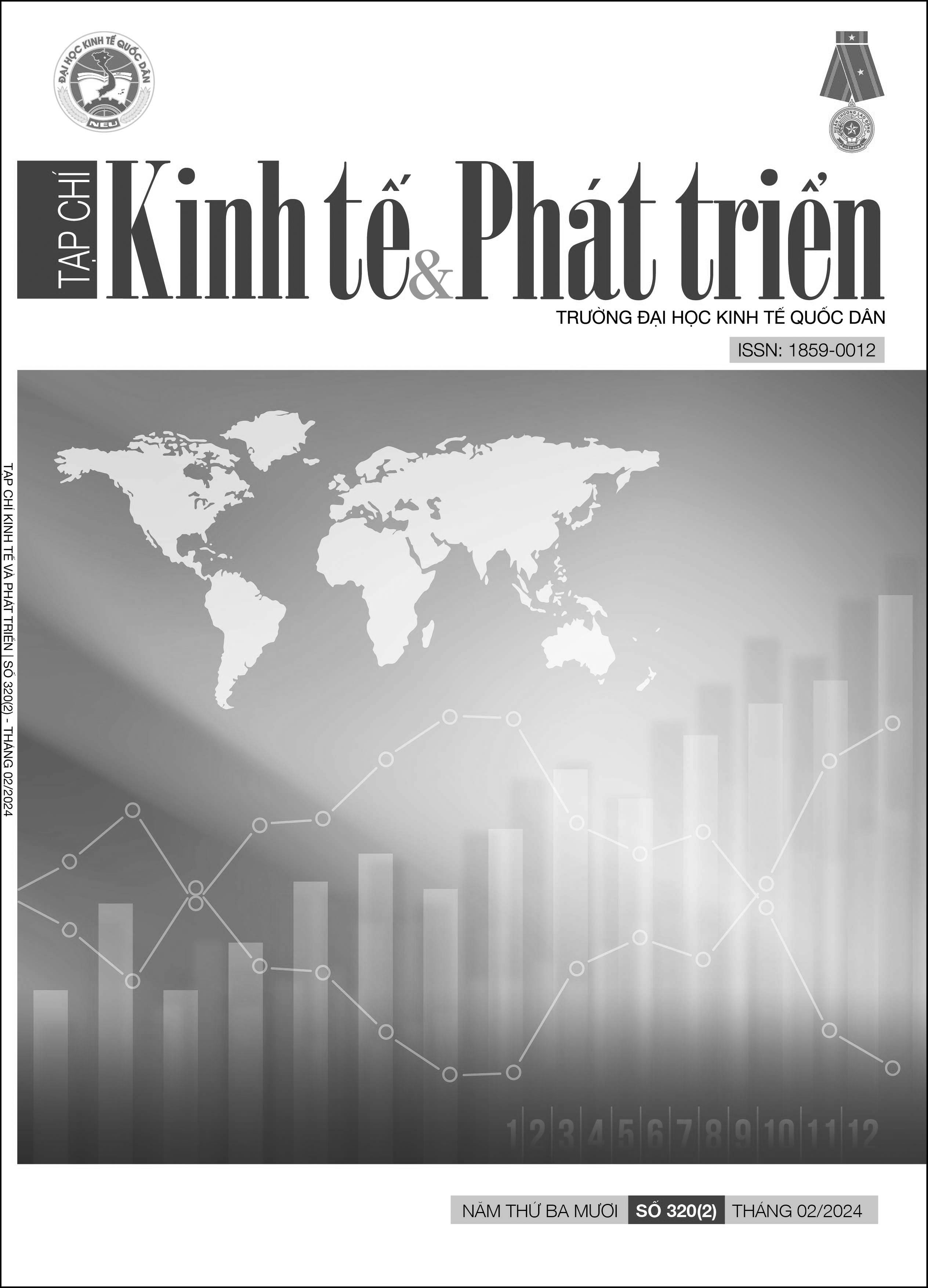Tác động của rủi ro địa chính trị đến nắm giữ tiền mặt của các doanh nghiệp trong lĩnh vực năng lượng
DOI:
https://doi.org/10.33301/JED.VI.1750Từ khóa:
Nắm giữ tiền mặt, năng lượng, rủi ro địa chính trị, môi trường thể chếTóm tắt
Mục tiêu của nghiên cứu này là phân tích tác động của rủi ro địa chính trị đến nắm giữ tiền mặt của các doanh nghiệp năng lượng trên phạm vi toàn cầu. Sử dụng dữ liệu bảng gồm 10.321 quan sát trong giai đoạn từ 2009 đến 2022, kết quả hồi quy sử dụng các phương pháp khác nhau gồm OLS gộp, hiệu ứng cố định công ty và GMM chỉ ra rằng tỷ lệ nắm giữ tiền mặt của các doanh nghiệp giảm xuống khi rủi ro địa chính trị leo thang. Phân tích sâu hơn cho thấy mối quan hệ ngược chiều giữa rủi ro địa chính trị và nắm giữ tiền mặt càng rõ ràng hơn ở những doanh nghiệp thực hiện chi trả cổ tức tiền mặt nhiều hơn, qua đó gợi mở nguyên nhân của sự giảm sút tiền mặt làm do gia tăng chi trả cổ tức. Ngoài ra, kết quả nghiên cứu cũng nhấn mạnh vai trò của môi trường thể chế trong việc chi phối các chính sách tài chính của doanh nghiệp để ứng phó với các bất ổn từ môi trường kinh doanh. Các kết quả nghiên cứu cung cấp hàm ý quan trọng đối với các nhà quản lý doanh nghiệp trong việc quản trị vốn lưu động và các nhà hoạch định chính sách trong việc nâng cao chất lượng thể chế nhằm hỗ trợ các doanh nghiệp thực thi các chính sách tài chính tốt hơn.
Tài liệu tham khảo
Ahmed, M.S., Kumar, S., Gupta, P. & Bamel, N. (2024), ‘CEO media coverage and cash holdings’, International Review of Financial Analysis, 91, 103041.
Alexander, A., De Vito, A. & Menicacci, L. (2024), ‘At what cost? Environmental regulation and corporate cash holdings’, Finance Research Letters, 61, 104960.
Alomran, A.A. (2024), ‘Blockholder ownership and corporate cash holdings: evidence from European firms’, International Journal of Managerial Finance, 20(1), 1-19.
Baur, D.G. & Smales, L.A. (2020), ‘Hedging geopolitical risk with precious metals’, Journal of Banking & Finance, 117, 105823.
Bruna, M.G., Loprevite, S., Raucci, D., Ricca, B. & Rupo, D. (2022), ‘Investigating the marginal impact of ESG results on corporate financial performance’, Finance Research Letters, 47, 102828.
Caldara, D. & Iacoviello, M. (2022), ‘Measuring geopolitical risk’, American Economic Review, 112(4), 1194-1225.
Chen, L., Gozgor, G., Lau, C.K.M., Mahalik, M.K., Rather, K.N. & Soliman, A.M. (2024), ‘The impact of geopolitical risk on CO2 emissions inequality: Evidence from 38 developed and developing economies’, Journal of Environmental Management, 349, 119345.
Da Cruz, A.F., Kimura, H. & Sobreiro, V.A. (2019), ‘What do we know about corporate cash holdings? A systematic analysis’, Journal of Corporate Accounting & Finance, 30(1), 77-143.
Demir, E., Díez-Esteban, J.M. & García-Gómez, C.D. (2019), ‘The impact of geopolitical risks on cash holdings of hospitality companies: Evidence from emerging countries’, Journal of Hospitality and Tourism Management, 39, 166-174.
Dittmar, A., Mahrt-Smith, J. & Servaes, H. (2003), ‘International corporate governance and corporate cash holdings’, Journal of Financial and Quantitative analysis, 38(1), 111-133.
Elnahas, A., Hossain, M.N. & Javadi, S. (2024), ‘CEO marital status and corporate cash holdings’, European Financial Management, 30(1), 187-229.
Feng, C., Han, L., Vigne, S. & Xu, Y. (2023), ‘Geopolitical risk and the dynamics of international capital flows’, Journal of International Financial Markets, Institutions and Money, 82, 101693.
Gujarati, D.N. (2003), Basic Econometrics, 4th edition, NewYork: McGraw-Hill.
Javadi, S., Mollagholamali, M., Nejadmalayeri, A. & Al-Thaqeb, S. (2021), ‘Corporate cash holdings, agency problems, and economic policy uncertainty’, International Review of Financial Analysis, 77, 101859.
Julio, B. & Yook, Y. (2012), ‘Political uncertainty and corporate investment cycles’, The Journal of Finance, 67(1), 45-83.
Khraiche, M., Boudreau, J.W. & Chowdhury, M.S.R. (2023), ‘Geopolitical risk and stock market development’, Journal of International Financial Markets, Institutions and Money, 88, 101847.
Kim, Y.S., Park, K.J. & Kwon, O.B. (2019), ‘Geopolitical risk and trading patterns of foreign and domestic investors: Evidence from Korea’, Asia‐Pacific Journal of Financial Studies, 48(2), 269-298.
Lee, C.C. & Wang, C.W. (2021), ‘Firms' cash reserve, financial constraint, and geopolitical risk’, Pacific-Basin Finance Journal, 65, 101480.
Li, X., Pan, Z., Ho, K.C. & Bo, Y. (2024), ‘Epidemics, local institutional quality, and corporate cash holdings’, International Review of Economics & Finance, 92(C), 193-210.
Machokoto, M., Chipeta, C. & Ibeji, N. (2021), ‘The institutional determinants of peer effects on corporate cash holdings’, Journal of International Financial Markets, Institutions and Money, 73, 101378.
Maheshwari, Y. & Rao, K.V. (2017), ‘Determinants of corporate cash holdings’, Global Business Review, 18(2), 416-427.
Myers, S.C. (2000), ‘Outside equity’, The Journal of Finance, 55(3), 1005-1037.
Opler, T., Pinkowitz, L., Stulz, R. & Williamson, R. (1999), ‘The determinants and implications of corporate cash holdings’, Journal of Financial Economics, 52(1), 3-46.
Pang, J., Wang, K. & Zhao, L. (2024), ‘Tax enforcement and corporate cash holdings’, Journal of Business Finance & Accounting, https://doi.org/10.1111/jbfa.12795.
Petersen, M.A. (2009), ‘Estimating standard errors in finance panel data sets: Comparing approaches’, Review of Financial Studies, 22(1), 435-480.
Pringpong, S., Maneenop, S. & Jaroenjitrkam, A. (2023), ‘Geopolitical risk and firm value: Evidence from emerging markets’, The North American Journal of Economics and Finance, 68, 101951.
Qin, Y., Hong, K., Chen, J. & Zhang, Z. (2020), ‘Asymmetric effects of geopolitical risks on energy returns and volatility under different market conditions’, Energy Economics, 90, 104851.
Salisu, A.A., Lasisi, L. & Tchankam, J.P. (2022), ‘Historical geopolitical risk and the behaviour of stock returns in advanced economies’, The European Journal of Finance, 28(9), 889-906.
Shrestha, K., Philip, S.S.S. & Khaw, K.L.H. (2024), ‘Impact of geopolitical risk on target debt ratio’, Finance Research Letters, 60, 104964.





